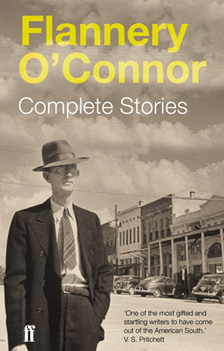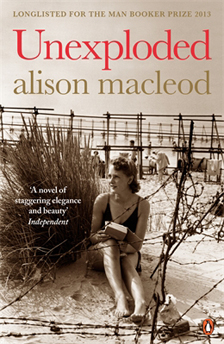Flannery O’Connor: ‘Good Country People’
by Alison MacLeod As both a reader and writer of stories, I love, perhaps more than any other quality of the form, the daring that defines the very best short stories: that breathtaking break with expectation, or subject matter, or reality as we know it. No story writer, it seems to me, had – or has – a greater sense of daring than Flannery O’Connor. Her stories leave me startled and moved, as if the hidden reality of this life or that life has just flared in the room in front of me. For an instant, I’m left blinking at the sudden illumination.
As both a reader and writer of stories, I love, perhaps more than any other quality of the form, the daring that defines the very best short stories: that breathtaking break with expectation, or subject matter, or reality as we know it. No story writer, it seems to me, had – or has – a greater sense of daring than Flannery O’Connor. Her stories leave me startled and moved, as if the hidden reality of this life or that life has just flared in the room in front of me. For an instant, I’m left blinking at the sudden illumination.
Mary Flannery O’Connor (1925–1964) was a bold, even ballsy, writer, confronting issues of race, religious fundamentalism and social hypocrisy in the American South and, specifically, in her own native Georgia. Reading the advance proofs of her second book, her story collection A Good Man is Hard to Find (1955), Evelyn Waugh – evidently brought up short by the experience – commented: “If these stories are in fact the work of a young lady, they are indeed remarkable.” They were of course, and they are.
O’Connor had little patience in fiction for “hazy compassion”, unearned moments of redemption, and comfortingly “moral” conclusions, or for a reader’s expectation of any of the above. Instead, she was a writer who held her nerve as each story took a life of its own on the page. Risking the frustration of her editors, she listened only to the given story’s internal imperatives. For her, a great story needed “the violence of a single-minded respect for the truth” 1, and at the heart of O’Connor’s “violence” is a sense of mystery that fascinates me.
‘Good Country People’ opens in the home of Mrs Hopewell, mother to the overgrown, unmarried, and joyless Joy. Mrs Hopewell, we learn, “had no bad qualities of her own but she was able to use other people’s in such a constructive way that she never felt the lack.” She and Joy are joined in their kitchen most mornings by the nosy Mrs Freeman, the wife of Mrs Hopewell’s tenant farmer. Mrs Freeman, we learn, approaches human dealings with “the advance of a heavy truck”.
O’Connor’s wit is wry and light in its delivery, but its grip on a character is vice-like. Mrs Hopewell’s speech is full of homespun truisms which she righteously offers to others as the wisdom of the years. Nothing is perfect. That is life! It takes all kinds to make the world. Mrs Hopewell can spot “trash” from “real genuine folks”, and is herself, allegedly, a model of decorum and sensitivity. Together, she and Mrs Freeman put the world to rights between their daily counts of the number of times that Mrs Freeman’s pregnant daughter has vomited that morning.
 Joy Hopewell is large and hulking, with a weak heart, spectacles and eyes of icy blue. She “lumbers” and “stumps” angrily on her wooden leg (her real leg lost to a childhood hunting experience), and fixes the world with the look of “someone who has achieved blindness by an act of will and means to keep it.” Yet as a Doctor of Philosophy, she prides herself on her sharp intelligence and resents the patronising attitude of her mother, who thinks of her daughter as a “poor stout girl in her thirties who had never danced a step or had any normal good times”.
Joy Hopewell is large and hulking, with a weak heart, spectacles and eyes of icy blue. She “lumbers” and “stumps” angrily on her wooden leg (her real leg lost to a childhood hunting experience), and fixes the world with the look of “someone who has achieved blindness by an act of will and means to keep it.” Yet as a Doctor of Philosophy, she prides herself on her sharp intelligence and resents the patronising attitude of her mother, who thinks of her daughter as a “poor stout girl in her thirties who had never danced a step or had any normal good times”.
With Joy – who has renamed herself Hulga in an act of filial rebellion – we find the “peculiarity or aloneness” of experience that preoccupied O’Connor as a writer. Only nosy Mrs Freeman, with her “special fondness for the details of secret infections, hidden deformities, [and] assaults upon children”, had “penetrated far enough behind [Joy-Hulga’s] face to reach some secret fact”: the trauma of her childhood injury and the intensely private experience of her wooden leg. Mrs Freeman could always listen to Mrs Hopewell’s account of the accident at “any time as if it had happened an hour ago”.
Into Hulga’s vast solitude enters Manley Pointer, a door-to-door Bible salesman with a heavy valise and “real genuine” values that win over Mrs Hopewell. Hulga, initially contemptuous, is softened by his schoolboy crush on her, and then, against every odd, touched when she discovers that he too has a heart condition.
“I think a lot. I’m not like these people that a serious thought don’t ever enter their heads. It’s because I may die.”
“I may die too,” she said suddenly and looked up at him. His eyes were very small and brown, glittering feverishly.
She agrees to walk out with him on his next visit, and in the night, she dreams of seducing him. However, on their lovers’ walk, when Manley seizes the moment and kisses her, she feels a rush of adrenaline and power, but little else. She “was pleased to discover that it was an unexceptional experience and all a matter of the mind’s control. Some people might enjoy drain water if they were told it was vodka.” Joyless Hulga, we realise, is not only physically stunted but emotionally crippled too. Nor does she believe in anyone or anything, and her scepticism, she believes, has set her free. It is her “salvation”. And so we arrive at that most potent of dramatic situations: two ‘opposite’ characters – a wannabe missionary and a knee-jerk atheist – alone together in a confined space.
In the remote hay-loft of a barn, Hulga permits his sticky, child-like kisses and pities him when he declares his love, demanding that she do the same. “Yes, Yes,” she says at last, purely to appease. But he insists that she prove it. The view of the surrounding landscape through the narrow window is “shifty”. The moment ripples with uncertainty and strangeness. Then: “He leaned over and put his lips to her ear. ‘Show me where your wooden leg joins on.’”
It is one of the most mysterious moments in fiction, and is as disturbing as it is compelling:
The girl uttered a sharp little cry and her face instantly drained of color. The obscenity of the suggestion was not what shocked her[…] But she was as sensitive about the artificial leg as a peacock about his tail. No one ever touched it but her. She took care of it as someone else would his soul, in private and almost with her own eyes turned away[…] When after a minute, she said in a hoarse high voice, “All right,” it was like surrendering her own life and finding it again, miraculously, in his.
It is a hauntingly intimate moment, and oddly sexual too. We watch him uncover and touch the “ugly jointure” where the artificial limb is attached to the stump of her leg. It is an unexpected cleavage that somehow evokes other private cleavages of the female body, and Manley Pointer, true to his name, is aroused. He removes her false leg and places it beyond her reach. “She gave a little cry of alarm but he pushed her down and began to kiss her again.”
Only then do we, along with Hulga, understand that this “innocent” Bible-selling boy is anything but. In his valise, he reveals a trick Bible that holds a flask of whisky and a pack of erotic playing cards. Using a series of false names, he peddles Christianity for cash, and to Hulga he says, “I hope you don’t think […] I believe in that crap!” Immobile, she screams for her leg, but he’s already scooping it up like a trophy, packing it in his case, and declaring in a careless aside that he once carried away a woman’s glass eye.
Wow, I scribbled in the margin of my copy. Go, Flannery.
Critics often blandly assert that ‘Good Country People’ is an exposé of human arrogance and hypocrisy, and of course, who could disagree? But that reduction to so neat a theme was the kind of reading of which O’Connor herself despaired 2 : “there will always be people who will refuse to read the story you have written”.
She herself was interested, above all, in the mysterious, inner life, the life that, against every outward appearance, makes intimates of us all, even the loner Hulga. The effect on the reader of that direct encounter with another inner life is one I find hard to describe. “Fiction should be both canny and uncanny,” O’Connor tells us. The effect is as much visceral and felt as it is verbal.
Ultimately, for Flannery O., the job of the story writer is to push “outward towards the limits of mystery”. In her hands, the short story is nothing less than “an incarnational art” – or life flaring off the page.
1 By contrast, she notes, as incisively as ever, “In fact, so many people can now write competent stories that the short story as a medium is in danger of dying of competence.”
2 “People have a habit of saying, ‘What is the theme of your story?’ and they expect you to give them a statement: ‘The theme of my story is the economic pressure of the machine of the middle class’ – or some such absurdity. And when they’ve got a statement like that, they go off happy and feel it is no longer necessary to read the story […] but for the fiction writer himself the whole story is the meaning, because it is an experience, not an abstraction.”
 Alison MacLeod’s Unexploded, a compelling novel of love and prejudice in wartime Brighton, was longlisted for the 2013 Man Booker Prize and is now published in paperback and eBook by Penguin. She is the author of two other novels and a story collection, and is Professor of Contemporary Fiction at the University of Chichester. Read more.
Alison MacLeod’s Unexploded, a compelling novel of love and prejudice in wartime Brighton, was longlisted for the 2013 Man Booker Prize and is now published in paperback and eBook by Penguin. She is the author of two other novels and a story collection, and is Professor of Contemporary Fiction at the University of Chichester. Read more.
alison-macleod.com
Flannery O’Connor’s Complete Stories are published by Faber & Faber.

